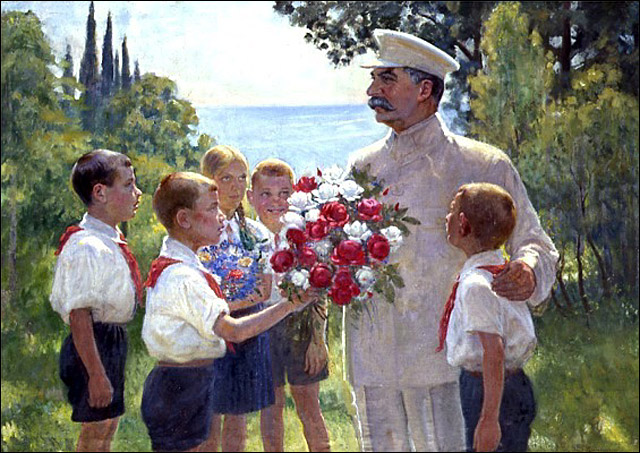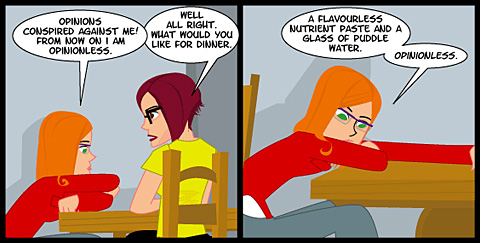

Koba the Dread
Subject
Evaluation
Joe Bob But in reading Koba the Dread, I was reminded of, of all things, issue #3 of Christopher J. Priest's Black Panther. Issue #3 begins with Ross telling Nikki about a guy named Bob whose wife had run off with the rebel leader who had stabbed Bob 32 times. Ross relates, "Bob went after his wife's mother and father. Her brothers, their wives and children. Her sisters and their families. He burned all of their homes to the ground and stabbed them exactly 32 times. Bob went after his wife's friends. Her teachers. He worked the list. He went after every living soul his wife had ever encountered until, finally, there was nobody left except Kaleb, a merchant from a nearby village. He had once sold Bob's wife a pair of shoes." We then watch Bob decapitate Kaleb. This sounds not entirely dissimilar from what Joseph Stalin did. Bob killed everyone who had ever crossed paths with his wife. Joe also killed everyone who had ever crossed paths with a certain someone. But that certain someone wasn't his wife. It wasn't Leon Trotsky. It was Joseph Stalin. Amis's diagnosis of the Great Terror is that Stalin had a reality problem. He had enough power that he could rewrite the past and get an entire nation to go along with him. Textbooks would reflect a history that had never happened. Key figures in the Revolution would confess to whatever counterrevolutionary crimes Stalin claimed they'd committed. But, still, they knew who Joseph Stalin was. They knew that Stalin's role in the October Revolution was negligible, knew that his "revolution from above" had been a disaster, knew that he wasn't even Russian. They knew that the new truth was a lie; even though they would never say so, they knew. So they all had to die.
I see nussink But c'mon. Yes, people don't generally joke much about the Holocaust, as a rule. But neither do they joke about the gulag. Amis protests that indeed they do — he himself has nicknamed his daughter Butyrki, after a Moscow prison. Me... I'm thinking that this might not actually signify a trend. As it happens, the best joke I've encountered so far this year was a Nazi joke. In typical fashion, I'm going to analyze it to death, because jokes are always funnier when you explain them a whole lot. So it's Leap Day, February 29th, and I'm reading this extremely vapid article on sfgate.com about people lucky or unlucky enough to have it as a birthday. The running gag was that Grandma was only 16 and the fire chief was 11 and hardy har har. At first I thought the article was a waste of the 45 seconds I invested in it — but then I clicked open the comments. One read: "Since these people are essentially freaks, why not use them for medical experiments or something?" It seems to me that there are a few overlapping but still different ideas here that make the joke work. Idea #1: being born on February 29th qualifies someone as a freak. That's funny because it's such an overreaction. Idea #2: it's okay to subject people to involuntary medical experiments based on something as trivial as a birthdate. Again, that's funny because it's a wacky leap of logic that no one would ever make. But then there's idea #3: someone's status as a freak leaves one free to perform medical experiments on that person. And while that's also funny, it's not humor derived from overreaction; it is referential humor, relying on our knowledge that the Nazis actually did believe that. The source of comedy is that in asking a question that relies on that assumption, the over-eager speaker has blown his cover and revealed himself as a Nazi. Whoops! Another experiment. How many extremely well-known comedy pieces revolving around Nazism can I think of in five seconds? The Producers, Hogan's Heroes, the "Mr. Hilter" sketch in Monty Python's Flying Circus, and I can't type that fast so I guess I have to stop. I think that if pressed Amis would have to confess that his quickness to make Soviet jokes and lack of exposure to Nazi ones is merely an accident of his upbringing. Had he grown up in another household he might well have wound up calling his daughter Treblinka.
Can't make a comrade without breaking a few Freges The best answer I can come up with is informed by one of the classes I've been taking — not the USSR class, but John Searle's class on the philosophy of language. We've recently been discussing the work of Gottlob Frege. Now, I am sure that there is much about the Frege discussion that I have misunderstood, so much so that any resemblence between what follows and Frege's actual work is probably coincidental. But listening to Searle talk about Frege left me with a framework that I think is helpful here, so here goes. Consider the case of Superman. Jor-El and Lara place their infant son Kal-El into a spaceship and launch it just as their home planet Krypton explodes. Kal-El's ship crashlands in Kansas, and the baby is discovered by a kindly couple who raise him as their son. The foundling quickly proves to have amazing powers, and grows up to live a double life, saving lives and battling corrupt politicians as Superman while working for a newspaper as the mild-mannered Clark Kent. Clark Kent pines for fellow staffer Lois Lane, but she only has eyes for Superman, unaware that they are one and the same man. "The spineless worm!" she says in Action Comics #5. "I can hardly bear looking at him, after having been in the arms of a real he-man!" Now, let's take this apart. Lois Lane has two thoughts here:
But Clark Kent and Superman are the same guy! Both "Clark Kent" and "Superman" are names that refer to Kal-El, the last son of Krypton. Therefore, any statement that applies to one should apply to both. If Clark Kent is a spineless worm, then Superman is a spineless worm, because Clark Kent is Superman. And if Superman is a real he-man, then Clark Kent is a real he-man, because Superman is Clark Kent. Yet if you told Lois Lane (at least in 1938) that Superman was a spineless worm or that Clark Kent was a real he-man, she would vociferously disagree. That would be a logical error! What gives? Frege accounted for the discrepancy by distinguishing between the sense and the reference of an expression — and here is where I'm pretty sure I'm deviating from his use of these terms, so don't take what follows as an orthodox account of Frege. But what I took away from Searle's presentation is this: the sense of an expression is what the speaker means by it, that cloud of feelings and associations that hover around it in the speaker's mind. The reference of an expression is the actual thing in the world identified by the expression. So when Lois Lane says "Clark Kent," her reference is to Kal-El, but her sense is "that wimpy reporter who wouldn't fight back when Butch Mason tried to cut into our dance." When she says "Superman," her reference is once again to Kal-El, but her sense is "that hunky superhero who saved me from drowning when the Valleyho Dam collapsed." So thus we no longer have to come to the silly conclusion that Lois is falling into logical error — she merely has incomplete information. (Note that incomplete information isn't the only reason that people's senses of a term might lead to different conclusions about it. Lois Lane and Lex Luthor are referring to the same individual when they say "Superman," but one means "that hunky superhero who saved me from drowning when the Valleyho Dam collapsed" and the other means "that meddling superhero who keeps foiling my schemes.") The USSR under Stalin was a totalitarian nightmare in which peasants starved by the millions and city dwellers spent their nights waiting for the knock on the door that meant a lifetime, long or short, of torture. But the image that the Communist Party and its allies abroad put forward was of a workers' paradise, a land of plenty and of equality both legal and economic. And people like Amis's father Kingsley fell for that image. So they would say things like, "We should use the USSR as a model for our own country." And people would disagree with them for two very different reasons. To conservatives, the reference of the expression "the USSR" was irrelevant. The sense itself was enough to merit disagreement. For even today there are people who argue in favor of economic inequality — hell, for years the US government has actively fostered it. The idea is that some people deserve to be rich and some people deserve to be poor, and capitalism assures that people will get what they deserve. So when Western communists said, "We should use the USSR as a model for our own country," they meant, "We should turn our country into a paradise built on legal and economic equality" — and conservatives disagreed. But others — Orwell would be the obvious example here — believed wholeheartedly that creating a paradise of legal and economic equality was indeed the worthiest of goals. But they disagreed with the idea that the expression "the USSR" signified that paradise. To them, "the USSR" meant the totalitarian nightmare I mentioned a moment ago — that is, that was their sense of the term. Now, I think the historical record makes it completely obvious that they were correct and that "totalitarian nightmare" is a good way to describe the reference of the term "the USSR," the real country that took up the entirety of northern Asia at the time. But that's a different argument from the conservative one, and it's less damning to be on the wrong side. When Hitchens and Kingsley Amis and Robert Conquest make rueful jokes about the communist activities of their youth, they mean, "Man, we were suckers, weren't we?" But that's different from being evil. Because now we turn to the case of people who supported Nazi Germany. Again we have a term, "Nazi Germany" in this case, that refers to a country that most everyone agrees was a totalitarian nightmare. But what sense did its supporters have in mind? What's the best spin? I don't think you can come up with anything that isn't evil. The Soviets claimed their country was based on justice and equality; that was a lie. The Nazis claimed their country was based on racial purity, militarism, and Gleichschaltung — making people not equal, but identical — and it doesn't matter whether that's a lie. Supporting Nazi Germany based on its propaganda doesn't make you a sucker. It makes you a monster. Hence the difference.
Utopia Martin Amis takes the opposite view. He sneers that "any utopia" is inherently a "farce" and a "travesty" and even a "species of hell." He describes himself as a lifelong skeptic of "political faith," preferring the path of the "agnostics." The problem with the Bolsheviks, Amis argues at the end, is not that they sinned in deciding that the Just City was worth a few million corpses, but in dreaming of the Just City at all; to utopians, he contends, the ends inevitably justify the means. It occurs to me that there's another guy named Martin who would probably disagree with that. We have a holiday for him.
Return to the Calendar page! |

